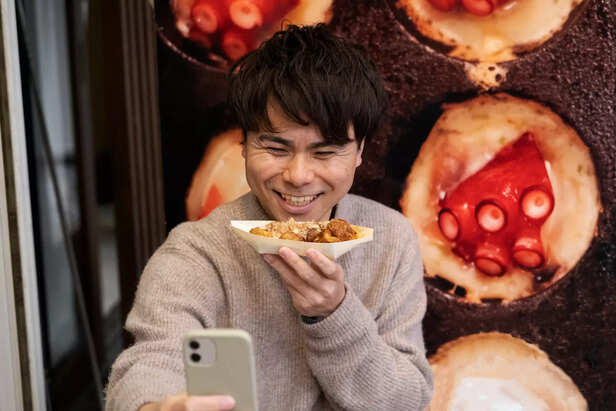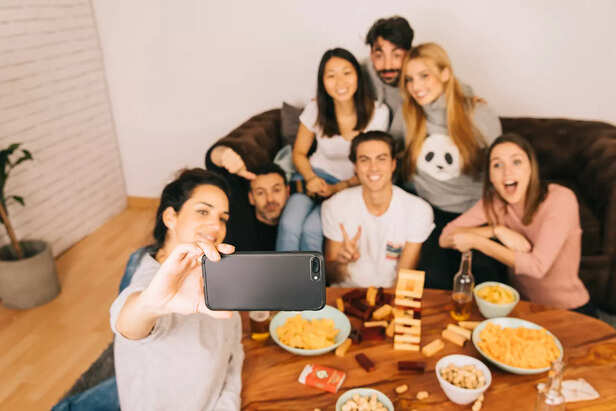Indian Food Traditions: When Serving Others Comes Before Yourself
Vaibhav Kochar | Sep 04, 2025, 19:30 IST
Woman cooking
( Image credit : Freepik )
In many Indian families, elders traditionally prioritize feeding others. Now, younger generations are embracing self-care by ordering their own food. This shift brings emotional conflict, as old values clash with new freedoms. The key is balance. Families can redefine love by sharing meals and respecting everyone's needs. This creates equality and joy at the dining table.
In many Indian homes, children grow up watching elders, especially mothers, serve everyone else before taking even a single bite themselves. Food was never just food; it was love, sacrifice, and respect. Eating last was not seen as a sign of suffering, but rather as a natural role. It silently taught us values: patience, care, and putting others before ourselves. Yet, hidden behind that patience was also a truth: sometimes, love came with the burden of always being second.

Today, things are changing. We live in cities, we earn for ourselves, and we have the freedom to order food just for us. For the first time, we are not waiting for anyone else to eat first. It feels new, probably weird, but also freeing. Ordering your own plate is not selfishness; it is self-respect. It means we are finally giving importance to our hunger, our choices, and our identity. This small act reflects a bigger shift, from sacrifice without choice, to care that includes ourselves too.

But let’s be honest, this change is not simple. A part of us still feels guilty when we eat first, because deep inside, we remember those who ate last for us. Many mothers, grandmothers, and even fathers quietly gave up their share so the children never felt a shortage. When we pick up food first today, that memory stays with us. This conflict shows how culture travels through generations, we move forward, but the past still sits with us at the table.

The real lesson is not about who eats first or last, but about balance. True care should not mean one person always sacrifices. Real love means sharing, eating together, and respecting everyone’s hunger equally. As we learn to order food for ourselves, we also need to remember to ask others, “What would you like?” That simple question can carry the warmth of tradition, without repeating the unfairness of it. This is how families change, not by destroying the old values but by changing them with equality.

Growing up, watching others eat first taught us empathy. Ordering for ourselves today teaches us self-worth. Both are valuable lessons. However, the future of our dining tables should not have quiet sacrifices; it should have equality, it should have joy, it should have togetherness, because food tastes better when everyone is eating at the same time and no one is having to wait.
Explore the latest trends and tips in Health & Fitness, Travel, Life Hacks, Fashion & Beauty, and Relationships at Times Life!
Learning to Put Ourselves First

Put yourself first
( Image credit : Freepik )
Today, things are changing. We live in cities, we earn for ourselves, and we have the freedom to order food just for us. For the first time, we are not waiting for anyone else to eat first. It feels new, probably weird, but also freeing. Ordering your own plate is not selfishness; it is self-respect. It means we are finally giving importance to our hunger, our choices, and our identity. This small act reflects a bigger shift, from sacrifice without choice, to care that includes ourselves too.
The Emotional Conflict of Change

Change is not simple
( Image credit : Freepik )
But let’s be honest, this change is not simple. A part of us still feels guilty when we eat first, because deep inside, we remember those who ate last for us. Many mothers, grandmothers, and even fathers quietly gave up their share so the children never felt a shortage. When we pick up food first today, that memory stays with us. This conflict shows how culture travels through generations, we move forward, but the past still sits with us at the table.
Redefining Love and Care in Modern Times

Togetherness
( Image credit : Freepik )
The real lesson is not about who eats first or last, but about balance. True care should not mean one person always sacrifices. Real love means sharing, eating together, and respecting everyone’s hunger equally. As we learn to order food for ourselves, we also need to remember to ask others, “What would you like?” That simple question can carry the warmth of tradition, without repeating the unfairness of it. This is how families change, not by destroying the old values but by changing them with equality.
We Should Change Our Perception

Include yourself too
( Image credit : Freepik )
Growing up, watching others eat first taught us empathy. Ordering for ourselves today teaches us self-worth. Both are valuable lessons. However, the future of our dining tables should not have quiet sacrifices; it should have equality, it should have joy, it should have togetherness, because food tastes better when everyone is eating at the same time and no one is having to wait.
Explore the latest trends and tips in Health & Fitness, Travel, Life Hacks, Fashion & Beauty, and Relationships at Times Life!
Frequently Asked Questions (FAQs)
- Why did Indian parents or elders often eat last at meals?
Because serving others first was seen as love, care, and respect. - Does eating last in Indian culture affect children psychologically?
Yes, it teaches sacrifice, but sometimes builds guilt and hesitation. - How is modern dining culture changing this tradition in India?
People now balance respect for family with self-care and equality. - Can ordering food for yourself be considered disrespectful?
Not at all, it reflects independence while still valuing family love.
